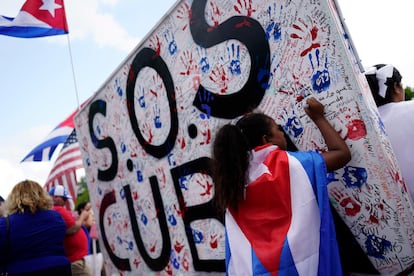Cuba to ease passport fees and rules in a bid to ‘reinforce ties’ with community abroad
Reducing the cost of maintaining valid travel documents for citizens residing abroad had been a longstanding demand of Cuban-Americans

The Cuban government this week announced a series of measures to “reinforce ties with its citizens abroad.” The move chiefly entails making the procedure for obtaining a Cuban passport cheaper and more flexible.
Cuban citizens living abroad need a Cuban passport to travel to the island even if they have a passport and citizenship from another country — an exception had been made for those born before 1971, but it is being eliminated. The new measures, which enter into force on July 1, will extend the validity of new passports to 10 years, reduce fees for renewing them abroad and eliminate the requirement to extend the passport’s validity every two years, a procedure that currently costs around €90 in Europe and $180 in the United States, where more than 1.5 million Cubans reside.
According to the general director of Consular Affairs and Cuban Residents Abroad (DACCRE), Ernesto Soberón, the new measures reflect the government’s desire to “facilitate Cuban travel abroad, their return to Cuba and increase their participation in the political, economic and social life of their country of origin.”
Cuban authorities will extend the validity of new passports from six to 10 years for citizens over 16 years of age, and to five years for those under that age. The cost to obtain or renew this document will decrease considerably for Cuban-Americans. The fee for a new adult passport will be $180, and $140 for minors under 16, regardless of the country in which they are requested, explained Soberón. This measure barely affects residents in European countries, where Cubans were already paying around €180 to obtain a new passport. However, the reduction is considerable for Cubans living in the United States, who currently must pay $350 to obtain a travel document, without which they cannot enter their country even if they have obtained US citizenship.
For a long time, lowering these fees had been one of the recurring demands made by the Cuban-American community in the US to the government in Havana, which has finally adopted the measures. Every year, hundreds of thousands of Cubans residing in the US travel to their home country, and they will be the ones who benefit the most.
Eliminating the requirement to extend the validity of the passport every two years will also mean considerable savings for Cubans, not to mention a reduction in bureaucratic hassle. On many occasions, Cuban travelers entering or leaving the country were barred from boarding the plane despite having a valid passport, because they had forgotten to pay the biannual extension fee.
Soberón also announced an extension to the right to live abroad uninterruptedly more than two years without losing permanent residency in Cuba, a rule that was introduced in March 2020 as part of a series of pandemic-era measures.
Sign up for our weekly newsletter to get more English-language news coverage from EL PAÍS USA Edition
Tu suscripción se está usando en otro dispositivo
¿Quieres añadir otro usuario a tu suscripción?
Si continúas leyendo en este dispositivo, no se podrá leer en el otro.
FlechaTu suscripción se está usando en otro dispositivo y solo puedes acceder a EL PAÍS desde un dispositivo a la vez.
Si quieres compartir tu cuenta, cambia tu suscripción a la modalidad Premium, así podrás añadir otro usuario. Cada uno accederá con su propia cuenta de email, lo que os permitirá personalizar vuestra experiencia en EL PAÍS.
¿Tienes una suscripción de empresa? Accede aquí para contratar más cuentas.
En el caso de no saber quién está usando tu cuenta, te recomendamos cambiar tu contraseña aquí.
Si decides continuar compartiendo tu cuenta, este mensaje se mostrará en tu dispositivo y en el de la otra persona que está usando tu cuenta de forma indefinida, afectando a tu experiencia de lectura. Puedes consultar aquí los términos y condiciones de la suscripción digital.








































